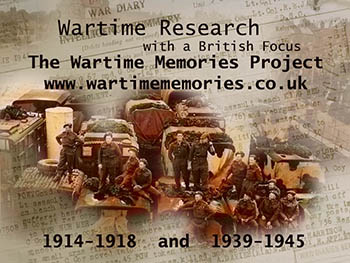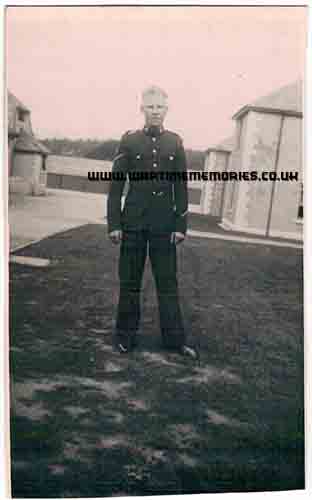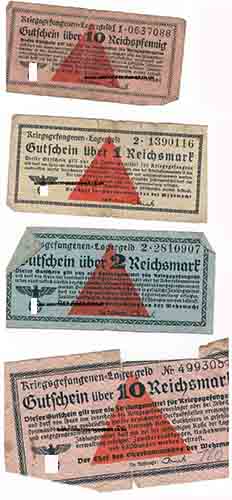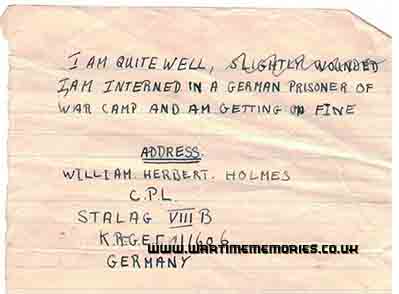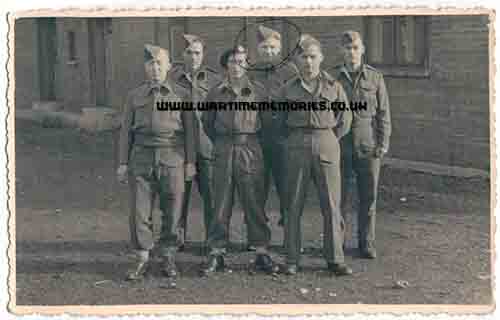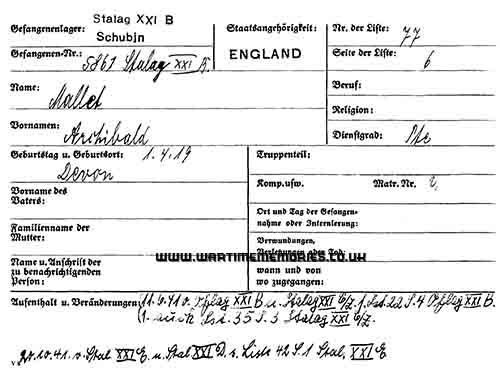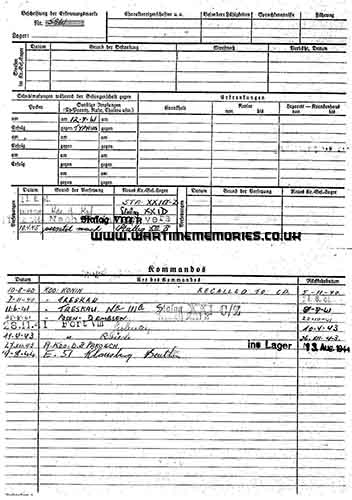William C. Law 2nd Btn. Gloucester Regiment
For You the War is Over Tommy
Of course it had to come, Hitler had been seizing all the smaller states and
threatening others. So when he marched on Poland it was the last straw, for
Britain had warned him that we would not stand idly by, but would go to the
aid of Poland.
It was the 3rd September 1939, and I was digging air-raid shelters when I heard
that we were at war with Germany; and it was only the day before, that I had
received my calling up papers, so it looked as though I would be in for some
excitement.
I lived in Bristol at this time, and as I was to join the local regiment which
was the "GLOUCESTERSHIRE" it meant that my training would be done at the
Horfield Barracks, Bristol. So on the 15th September 1939, I presented myself
at the correct hour, was "kitted out" that is the term used by the army for
being given a uniform and all that goes with it, such as a rifle & bayonet,
equipment and a housewife; no a housewife is not a lady, but a small cloth
pouch with needles and cotton in, so that you can mend your own clothes,
not quite so exciting, infact just the opposite, with all the name tags to
be sewn on, the boots to be burnished, the equipment to be blanco'ed, and
the brass to be cleaned. This was the first bit of training, where a man
had to learn discipline, up at 6am wash - shave, make-up beds, polish
barrack room floor and on parade in gym kit by 7am for P.E before breakfast,
then at 9am it would be on parade, fully dressed for the C.O.s inspection,
before a full day of drill and training for the day when you would have to
face the enemy.
After eight weeks of this basic training we were split into groups and I was
sent to the rugby ground with some others to have instructions on driving,
although all of us held driving licences, we had to learn to drive the army way.
All this time the war was going on, but no real action had taken place as far
as the army were concerned; at the start some soldiers had been sent to France
and this force had been called the B.E.F ( British Expeditionry Force ) but their
main function seemed to be digging anti-tank traps along the Belgium border,
with an occasional trip up in front of the MAGINOT LINE, "this being a concrete
structure along the German & French border, manned by the French army" and our
men would go out on patrol to see what the German soldiers were doing in their
defence line which was called the SIEGFREDE LINE
Our navy had been more active and had won a victory by making a German captain
scuttle his boat which was a pocket battleship called the "GRAF SPEEY".
On the other hand the R.A.F much to a lot of peoples annoyance had been going
over to Germany nearly every night dropping "no not bombs" but leaflets.
So Christmas came and so did the end of the year with nothing much done by us,
it seemed to be just a war of nerves; even the German troops seemed to be doing
nothing now as the war with Poland only lasted a few days because the Polish
army was no match for the might of the Germans.
After another eight weeks of training at the rugby ground we were finished
as far as training was concerned and ready to be sent to a unit for active service,
so another move, this time to the county cricket ground to await our allocation to
whatever we were assigned to. During this time things were very easy and apart
from having to get a lot of innoculations, we did not have much to do, I went out
two or three times as a bearer on military funerals.
At last we got "drafted" which means that we knew where we were to be some had
tropical kit issued to go to India to join our 1st battalion, but me and my mates
were to be sent to France to join the 2nd battalion, at last we would be going to
do something for our country.
So on Good Friday 1940, we bought hot cross buns on the railway station as we
enbarked for our journey and sung songs like "we're going to hang out the washing
on the SEGFREAD LINE" and "RUN ADOLF", as we sped through Southern England; to
board the boat, which was to take us across the channel.
It was just after daylight when we dissembarked at Le Harvre was taken to a train
for a three day and night ride to where our detatchment was. I do not know why
the journey took so long, I can only assume that we were taken around a bit to
throw any enemy agents off knowing how many troops were going to different places.
Mud and clay, digging deep anti-tank traps, so this was our lot as soon as we arrived
at the unit, then sometimes at night we would be sent out in the woods in sections
to have an exercise in compass reading, all the same things that we had been taught
in England but now more intent.
We heard Revalli blown on the bugle but it was not the usual time; infact it was
only just getting light, so what was it all about, the day was the 10th May 1940.
When we all got on parade our O/C "officer commanding" told us that the German
troops had started to invade Belgium. This was a very serious thing as Belgium
had said at the start of the war that she would remain neutral, now King Leopold
asked for help to try and save them; this of course meant that we went across
Belgium to try and stop the Germans, our section went up as far as Waterloo,
it's the place where Napolian made his stand, but I must say we did not;
we spent a couple of days and nights dug in on a bank but never saw any
enemy soldiers, only heard the shelling as barrages were layed to try and
stop them advancing but Germany had a more modern army and troops were
transported, by coach, car, motorcycle, with side-cars and even bicycles,
so he could out-flank us, and we started to pull back, marching back by day
and digging in a 'foxhole' at night, a foxhole was a small hole to give
you a bit of protection if you were attacked during the night.
After a few days of this, the roads began to get very overcrowded, with refugees
as families moved back with whatever they could take out of their homes, it was
a heartbreaking sight at times as some of the poorer people would try to
transport a sick old relative on a small cart, with the children crying for
lost or killed mothers, animals left to starve, and then the German 'Luftwaff'
started to make matters worse by flying low along the roads, straffing and
dropping aerial bombs down on everyone. At one point along this withdrawal
it was arranged for us to be picked up by lorries to try and get us back far
enough to make a good line of defence: The lorryies picked us up as arranged,
but before we had travelled very far the stukas came down and what a mess,
the truck that I was in got bombed just as we were trying to get out, my mate
sat next to me got the full force, I was lucky as the force sent me sprawling
to the ground, and I was only dazed. We then set up on the edge of the Albert
canel where the Germans got on the other side and sent up a balloon with an
observer to find out where we were, it was very demoralising to us, and
by the all that was left of our R.A.F had been recalled to Britain.
After two or three more days we were on the move again , this time we were to go
back over the border into France for a rest as you must remember that from the time
that we had left France we had only had odd snoozes while we were standing up in
trenches, when one man of the section was watching for the enemy; its surprising
what strains that the human body can stand.
Well what a relief, we have had that rest as promised, and a bath, shave and some
cooked food, now what, the rumour is that we are going back to England, for re-grouping,
it's quite on the cards; as we have lost quite a lot of our equipment, I had lost my
rifle when we had been bombed, and had been made the 'Bren Gunner' in my section. At
last we are on parade and the Brigadier addresses us, it appeared that the rumour had
been correct, BUT our Brigadier had decided to volunteer for us to try and hold the
Germans back while as many as possible was evacuated from Dunkirk. So this was the
way that things were to be.
We now moved up to a place called Cassel, it's about 30km from Dunkirk and stands
on top of a hill and on the 29th May 1940. 'AT Dawn' our Company of 164 men made
our way out of Cassel to take up positions in the village at enbankment, it must
have been about 10 or 11 o'clock before any action started, then we observed the
Germans in the distance going into the village another way, they appeared to be
cycle patrol , and not near enough to us for us to take any action. The day
was getting very hot by now, and we were not able to get any shade, we could
hear the other sections engaging the enemy, then they were coming towards
us so we started to fire; this held them up, but not for very long, as we
could see their next move was to go over the railway enbankment to approach
us from behind, so we had to get out; fast. We then went to the house that
our O/C had made his H/Q outside was our company truck , burning fiercely,
'having been hit by an anti-tank shell', inside the house the wounded were
being attended to, down in the cellar, we took up positions at the windows
and started firing again at the Germans, as by now they were coming at
us from all sides, the next thing was "A CRASH AND A FLASH" as a German
grenade came through the window, then the back door caved in and the
Germans were shouting to us to come out with our hands up, and as we
did so, some of them kicked us up the backside while others shouted
"FOR YOU THE WAR IS OVER TOMMY".
We were then lined up and searched, it was very very unpleasant as we did not
know what the Germans would do next, it was easy to see that one or two of them
was all for shooting us on the spot. 'It is understandable when you realise
that probably during the battle, we had killed and wounded some of their friends;
but war is war, and we had lost friends too, infact there was only 36 of us left
out of 164 which had started out for Belgium on the 10th'. But thank goodness
their better nature prevailed, so they made us form up in threes and marched us
off back through the lines. 'We were a very sad and sorry sight, utterly
dejected, and frustrated, with the German troops taking photos of us, and
shouting catcalls to us about how "ENGLAND WAS CAPOOT", meaning that England
was finished, and they would be in London the next week.
As the sun began to set that evening we were all taken into a small field, and
guards posted around the outside, ready to shoot anyone who tried to escape, most
of us though were too weary to do anything else but drop down and rest. But as the
night went on it got colder, then the dew began to form on the grass, we were all
waking up stiff and cold and cramped, as we now only had the clothes we stood up
in, and their was no hot drink to warm us up, infact nothing had we received from
our captors. The sun came up and we began to feel a little better, soon the
Germans got us going again and as we went along we were joined by more and more
prisoners of war until it looked like one continuous stream along the road,
as the day wore on, it got hotter again, and as we passed through the small
french villages, the women would risk getting shot at to give us a drop of water,
and perhaps if we were lucky a bit of bread or a smoke, and as evening approached
we were taken to a field again, for the night; but as we went in this time the
Germans had a boiler full of potatoes boiled in their jackets, and each p.o.w
was given two or three, it was not much, but better than nothing I suppose.
The next couple of days was about the same , then we reached the town of
Canbera and were taken to the French cavalry barracks and remained there
for a few days, being taken out in small numbers by the guards to do odd
little jobs, it was when I was returning from one of these jobs that we
saw Adolf Hitler go through on his way to Paris.
By now though we were all in bad shape, as we all had got lice, from not being able
to wash, and we all had diarrhoea or dysentry, through not having any propper food.
At last we finished being marched and were put into cattle trucks on a train to go
through Luxembourg and on into Trieste on the German border.
We then had some properly cooked soup and put on the train again to be taken
right across Germany and into Poland, a journey which took us nearly a week, as
by now the British bombers had stopped dropping leaflets and was at last dropping
the real thing, and causing quite a bit of havoc to the towns and cities of Germany.
In Poland we were taken to a place called TOREN it was a town made up of forts with
damp dungeon type passages inside, and we all had our old clothes taken from us, we
went into showers, and our clothes were put into steam ovens to kill the lice,
then we got them back, after that we had our registration as P.O.W. given a number
and had our photo taken, so that we now had the protection of the International
Red Cross; 'a very important thing for us as Germany now had to account
for anything that might happen to us. For the rest of 1940 our lives were
vey dull as we had nothing to do but walk round and round on the small grass
hill in the centre of the fort, and the Germans printed a small paper in
English about once a month, which they issued to us, which told us of some
terrifying things that was happening to Britain, Coventry flattened ,London
bombed every night, Bristol centre in rubble, then the navy sunk.
'O what frustration for us '. All this happening to all our families and
we can do nothing but walk around in small circles! And we were told that
after Germany won the war, we would not be going home until we had rebuilt
all that our bombers had done to the German cities.
All this time at least our food was regular, it was not very much, just a bowl
of soup a day, with a bit of bread about 3 slices, and a small knob of margarine'and
a spoonful of jam once or twice a week'.
We had a barbers shop and you went in at intervals to get a shave as no one had
a razor; also a hair cut, which was all your hair off, because it was a big problem
keeping down the lice. We would go at intervals to be deloused and have a bath,
as our boots wore out we were given wooden clogs to wear and pieces of rag instead
of socks, and as winter approached everyone was given an overcoat and hat, from what
the Germans had taken from Polish forces.
Early in the spring of 1941 we were sent to another town called GRAUDENZ and this
was better, because now we were taken out in small working parties to help repair
roads, or clearing some waste ground, also we came into contact with Polish people;
who not only gave us an odd loaf to stick up into our coat and smuggle back into
the camp, but also told us more of what was happening in the world, from which we
had been cut off from for so long.
Things began to look a bit brighter now as letters began to arrive from home and
even parcels, with some good things arrived, such as soap that you could get to
'lather'. It is rumoured that the soap issued to us is made from the bones of
Jewish political prisoners who has died, I know that it will not lather.
We are also beginnning to get food parcels coming through, which is helpful
as the Germans are beginning to cut down on our food. They are beginning to
feel the pinch as they cannot get any shipping into their ports. But the
Germans are still very sure that they will win the war, and a bit of friendly
rivalry seems to be coming into the relationship between us and our guards,
as we get to know a few more of them better.
But not all of them would take a joke and although they all respected us
because we were British they still showed us that they were the masters,
and we would do as we were told.
It was at this time that we got to see what all the fuss was about as we were
taken up to Danzigland to help with the harvesting, the strip of land known
as the corridor, was the bit of land , which Germany had gone to war with
Poland over, as being German; well they had the lot now.
TENS of thousands of soldiers went through Graudenz on their way to the Russian
front all through the summer, but the following winter, many of them came back
with frostbite, and fingers and toes dropping off. 'YES it reminded us all of that
remark, "for you the war is over tommy", we had at least been kept reasonably warm,
although we did have one bad job, we went off by train to this place, about 30
p.o.w.s with a few guards, and an Under-officer "just a lanc corpral" in charge,
we went to a small camp which consisted of 3 wooden huts one for us, one for
the guards and one for a cookhouse, plus another older shed for use as a wash
house and toilet. The job we had to do was about a mile from the camp ,
and it was supposed to be holes dug in the ground for foundations for some
large structure, but being on the top of a hill, in the middle of a very
hard winter,it needed a pnumatic drill before we could have made any
impression with the job, and when he was coming out to see how we were
getting on one day, he met us halfway back to camp, plowing through about
2 feet of snow. He went into the most violent rage, he threatened to shoot
us, told the guards to turn around and get us back up that hill, but
although we were made to go back, it was impossible to do any work.
When we returned to camp he told us that he was cutting our coal
ration to half a bucket, and he was going to stop the issue of Red
Cross parcels which had arrived for us. If ever we hated a man it
was him, another day he found that the cook had thrown away the potato
peelings instead of putting them into the pig swill, so he got us all
on parade in short sleeves in temperatures about 20 degrees below
to pick them up again. He was a very fat man so from then on he
had the nick-name "CARTOFFEL GUTS", cartoffel being the German for potato;
I think that any man that was at that camp, would have killed him,
if the opportunity had arisen.
But the job came to an end with as I say nothing much done, and we then went
away into Upper Silisia, this was then called the air raid shelter of Germany,
as it was too far for planes to come from England; and return, so the Germans
started to build factories and all the Prisoners and displaced persons, were
brought to work at this area. We were the lucky ones here as we had to be
treated as laid down in the Red Cross Convention, as both Germany and our
country had signed. But the Russians and Jews had no standing at all, they
were hounded to work even when they were so sick that they could hardly
stand, and unlike us "we had the army guarding us; but they had the S/S troops,
whos badge was the skull and crossbones; which I think they lived up to.
WE settled down here very well, Red Cross parcels began to arrive quite good,
we now had water and showers, new uniforms and army boots had been sent through
the Red Cross, infact we are having to rely more and more on the Red Cross, as the
Germans, keep on cutting back on our rations, with their food getting in short
supply, we have a concert party formed in the camp and various sporting activities.
Mail is being received from home, although it takes a couple of months, not at all
good news though, one of mine bore news of my mothers death, but we had to
carry on.
I had a nice job here as I was made a fitters mate to work on central heating,
with a German who had been a boy on the Rhine when the British tommys had been
in occupation after the first war, and had given him sweets.
So I was treated like another worker, and not as an enemy although, the man who
I worked with was given an arm-band to wear showing that he held the position of
a guard, and our regular guard made a check on us every now and again. The camp
that we lived in was on the edge of the factory area, so we had to be on parade
at 5.30am. to be taken into the area to start work at 6.00am. and remained there
until 6.00pm with a half hour break at 1.00pm for lunch, which was a bowl of
soup, brought around in heated containers.
After a while new faces came to the camp, and we began to hear how Rommel
had been chased back in Africa, and the Italians had given up. Also the
Russians were beginning to drive the German army back, after a disasterous
winter at Stalingrad.
As the work progressed on the factory we suddenly found that we were not the
air-raid shelter of Germany anymore, as the American air force started to
send flying fortresses over from Italy, that is when it began to get a
little ironic for us; as we were all for this except, we lost all the men
in the concert party, on one raid, and half a dozen others at another, as
the air-raids became more frequent, and the Germans began to be pushed back
on the Russian front, until we could hear the heavy guns firing.
On the 29th December 1944, we had to start moving back in the middle of a snow
storm, we set out on a march, that was to last for four months in which we went
through, Czechoslovakia, Austria and in circles around Germany, ending at
Scleswig Holstean, in being released by the advancing American forces. But
there were many incidences on the march, like when one of the Jews dropped
out with exhaustion in the snow, he was shot, or the day we got to Graz, a
small town in Austria, and found p.o.w.s running the gas works. Then the fatefull
day as we went through Beyruth, it was the day when wave after wave of bombers
came over until the sky was full of them going over to bomb Dresden.
We started to cheer but cheers turned to horror as bombs rained down all
around us, killing quite a few of my friends, who had survived and suffered all
through, only to be killed by our own bombs, just days before they would
have been free again. Then the day when three small planes R.A.F doing scout
duty for the advancing troops, swooped out of the sky , blasted a truck that
the guards used for their rations and carrying their things in, they then
flew over our heads doing victory rolls and waving to us.
It seemed very quiet, and when someone looked out of the barn that we
had been put into for the night, an unusual sight,no guard was there to
be seen, then someone said that he had heard gun fire during the night.
After a while it began to sink in that we were not being guarded any more,
then, surprise, out of the morning mist rolls an American tank, what relief
for us, now the guards came out from a cellar and surrendered to them, that is
all but one who thought he might get away, 'his name Cartoffel guts' and when
Yanks heard that he had been so bad, they blasted him down in the middle
of the field he was running across. We were told to remain at that place
for a couple of days, until transport was available to take us back to England.
In the meantime the Yanks told us that they were in a hurry to get to a
consentration camp, at a place called Belson, where it was said the
most horrifying things were taking place. "A fact which proved to be
correct and the world found out later".
Things happened fast on the day we began to be brought home, a fleet of
lorries took us Nurenberg, and one batch flown out right away for England
mostly the ones that were sick. I was not with that lot, so remained there
over night. The following morning a small mobile'doughnut and coffee' van
opened up and the woman in it spoke to us in English,that was something
that we had not heard for over five years, a woman speaking to us in our
own language, asking would we like some coffee and doughnuts, after
which she gave us all her signature, for she was none other than the film
star 'Marlene Deittrich' doing her bit to help the war effort.
That afternoon saw us aboard Decota transport planes but only as far as
Brussels, there we were taken to one of the best hotels, with lovely beds,
that had sheets, meals served to us at a table, with a table-cloth on, and
a vase of flowers, after a meal we then went down to a small basement shop,
run by the RED CROSS where we were given lots of good things , like shaving
things, socks, soap, flannel, hair cream, tooth paste and brush, blacking
and brushes, handkerchiefs, a big bar of chocolate, and lots of smiles,
all for free. Back at the hotel it was a nice hot bath, then into that
beautiful bed, what a good nights sleep that was. After breakfast the
next morning we took a walk around the city, then back for lunch, then
to the railway station to catch a train for Ostend, and a boat across
the channel. WHAT A GREAT SIGHT THE WHITE CLIFFS OF DOVER WERE TO US
and a band turned out to greet us.
YES NOW IT WAS TRUE, TOMMY FOR YOU THE WAR IS REALLY OVER.




